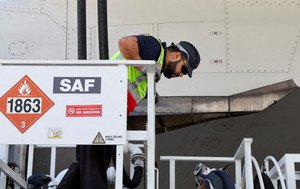At aviation meeting, ESG takes backseat to jet shortages
Published by Global Banking & Finance Review®
Posted on January 17, 2025
4 min readLast updated: January 27, 2026

Published by Global Banking & Finance Review®
Posted on January 17, 2025
4 min readLast updated: January 27, 2026

The Airline Economics conference saw sustainability sidelined by jet shortages, raising concerns about ESG fatigue and regulatory pressures.
By Joanna Plucinska and Tim Hepher
DUBLIN (Reuters) - A major annual air finance gathering largely skirted round the topic of sustainability this week - a rare departure from the industry's usual tight messaging on curbing emissions that left some delegates concerned about the impact of "ESG fatigue".
In contrast with the attention devoted to climate topics at earlier events, this year's Airline Economics conference was overshadowed instead by the scramble facing airlines just to keep their jets flying as they deal with parts shortages.
"The general consensus is that the sustainability subject is moving off centre," Simon Newitt, president of Sweden's Heart Aerospace, which is developing a 30-seat electric plane, told Reuters on the sidelines of the Dublin gathering.
"There are obviously very short-term issues that are occupying the various players' minds, but that doesn't mean that sustainability has somehow gone away."
Bottlenecks and parts shortages have forced airlines to keep older jets flying for longer, even as targets for sustainable aviation fuel (SAF) in the European Union come into force.
Industry leaders say there is less optimism over reaching the industry's over-arching goal of net zero carbon emissions by 2050. Aviation is responsible for 2-3% of carbon emissions.
"The rose-tinted glasses have come off," Deion McCarthy, an executive at Dubai Aerospace Enterprise, told the conference.
The increasingly tempered view comes weeks after airlines group IATA warned that not enough progress was being made to increase the supply of SAF as other problems take priority. The industry body insists that the targets are intact, however.
"Long-term, it's going to be an important part of getting to net zero ... but 2024 was a tough year," said Gordon Grant, head of investor relations at lessor Aviation Capital Group.
Several delegates warned this would not stem the tide of regulatory pressure in the European Union, where the cost of carbon is expected to become a growing part of airline costs.
The conference opened with a stark warning from one of the industry's leading forecasters.
"Sustainability is a big issue in this cycle," said Rob Morris, global head of consultancy at UK-based Cirium Ascend.
"That's going to become an even bigger issue, because if we don't demonstrate significant progress towards net zero, then regulators will observe our lack of progress and do something about it."
EMISSIONS GROWTH
The aviation industry has campaigned for years to prove its environmental credentials with a plan to curb emissions and a series of widely-promoted co-operation announcements between airlines and SAF producers or technology startups, but faces a backlash over claims of greenwashing in some European countries.
Lessors, who market planes across the world, paint a contrast between anti-flying sentiment in parts of northern Europe and the appetite for travel in fast-growing markets such as India.
Cracks are growing in the global response to climate change and investors say the return of Donald Trump as U.S. president could herald more regional divergence over the green transition.
Trump has vowed to repeal Joe Biden's green measures called the Inflation Reduction Act, which include tax credits for nascent SAF producers.
Trump aides argue the overall package would contribute to inflation, rather than taming it, and expand public deficits.
Environmental groups say that even if SAF production targets are met, emissions will keep growing as more planes are sold in coming decades.
Thomas Fowler, sustainability boss at Europe's Ryanair, defended the industry's record. Small steps like meeting an EU mandate to have 2% SAF in jet fuel blends this year are attainable and set a good precedent, he said.
Heart's Newitt urged the industry not to get distracted.
"The comment we often hear is: 'Don't you get it, we've got a business to run'," he said. "We are all running businesses but have serious challenges ahead and are realising the targets are most likely unachievable, and we have to do something about it."
(Additional reporting by Padraic Hapin and Conor Humphries. Editing by Mark Potter)
The article discusses how aviation sustainability was overshadowed by jet shortages at a major finance conference.
Jet shortages and immediate operational challenges have taken precedence over long-term sustainability goals.
The industry struggles with meeting SAF targets and faces criticism for potential greenwashing.
Explore more articles in the Finance category
